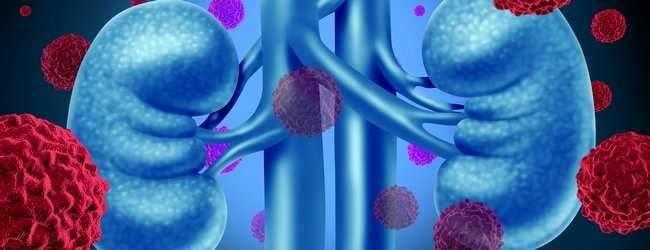Kidney cancers caught stealing genes from other cell types in order to spread

A study has identified how kidney cancers may develop the ability to spread around the body by hijacking genes from other cell types and 'stealing' their functions.
The study, led by scientists from the MRC Cancer Unitopens in new window at the University of Cambridge, suggests that this may also help to explain how other types of cancers spread – or metastasise – and provide new targets for cancer therapies.
To metastasise, cancer cells need to develop the ability to break away from the original tumour, survive moving around the body in the blood stream, invade another organ and form a secondary tumour.
Despite extensive studies searching for genetic mutations that lead to kidney cancer, much of what causes kidney cancers to spread in the body is still unexplained.
In this study, published in the journal Cancer Discovery, opens in new window, the researchers searched for explanations beyond mutations by studying how genes are switched on and off. They used human kidney and breast cancer cell lines taken from samples of human cancer in a mouse model to study how cancers spread.
Every cell in the body contains the same genes, but different types of cells exist because DNA has control systems that switch genes on and off in different cell types. These control systems, called enhancers, tell the cell when and where each gene should to be 'expressed' – they tell a gene to be switched on, so the genetic instructions can be copied and made into a protein.
In cancer cells that were able to spread and colonise other tissues, the scientists found that genes that are normally turned off in kidney cells were being expressed – the cancer cells hijacked genes that are normally turned on in white blood cells (cells that are part of the immune system and fight diseases). Hijacking these white blood cell genes helped the cancer to metastasise.
The researchers compared their findings to kidney cancer samples from hundreds of people with the most common type of kidney cancer - clear cell renal cell carcinoma - and found similar profiles of gene activation, suggesting that what they saw in the mouse models may be happening in human cancers. Results from experimental models of breast cancer suggested that similar mechanisms might also be at play in breast cancer patients.
Dr Sakari Vanharantaopens in new window, from the MRC Cancer Unit at the University of Cambridge and senior author on the paper, said: "How cancers develop the capability to spread is a long-standing problem that hasn't been fully answered by searching for mutations in genes. We show for the first time how cancers can steal the activity of specific enhancers - genetic regions which turn genes on and off - to activate genes from different tissue types. Activating these genes allows the cancer cells to steal features from normal cells, which facilitates their spread in the body."
"Metastasis is responsible for the majority of cancer-related deaths and this discovery helps us better understand how cancers spread and could provide new targets for cancer drugs that limit the capability of cancer cells to activate genes that should be switched off."
The researchers said what causes these changes in enhancer activation to occur is not yet fully understood.
Dr Nathan Richardson, Head of Molecular and Cellular Medicine at the MRC, said: "Understanding what enables cancers to metastasise and establish secondary cancers around the body is hugely important in our quest to tackle this disease and reveal new approaches to treatment."
More information: Paulo Rodrigues et al. NF-κB–Dependent Lymphoid Enhancer Co-option Promotes Renal Carcinoma Metastasis, Cancer Discovery (2018). DOI: 10.1158/2159-8290.CD-17-1211




















